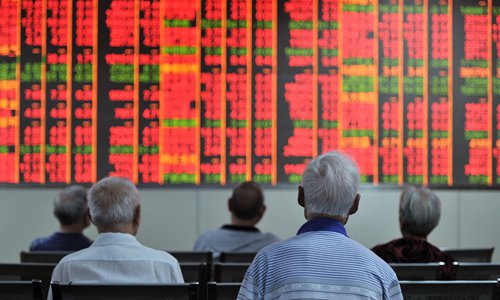March net capital outflows from Chinese mainland market temporary, may change as firms expected to report solid earnings
Foreign investors in transient shift to risk-off mode

Investors check the A-share market at a securities brokerage in Jinhua, East China's Zhejiang Province in July. Photo: VCG
Industry watchers try to decipher the reasons for net capital outflows from the Chinese mainland market over the past month, with many saying that US monetary policy tightening to curb inflation and the fallout of China-US regulatory divergences are causing overseas investors to make a transient shift to a risk-off mode.Heightened geopolitical tensions including the Ukraine crisis may have also unnerved overseas investors, observers said. They said the recent wave of capital outflows reflected foreign investors' temporary disorientation. This might change as Chinese mainland-listed firms are expected to report solid earnings this year, while the US market could face rising recession woes.
As of Tuesday's market close, net outflows from the A-share market through the north-bound link-ups between the mainland and Hong Kong bourses had totaled 58.29 billion yuan ($9.15 billion) over the past month, according to data from financial information provider Hithink RoyalFlush Information Network.
Notably, a key meeting hosted by China's top financial oversight body on March 16 addressed crucial issues, including progress on China-US audit talks. That meeting reversed an outright daily outflow over the previous week. In the wake of the sentiment-reversing meeting, net purchases were recorded on most of the days in the tie-up between the Shanghai and Hong Kong markets.
The previous wave of outflows was during March 2020, when there was a global US dollar liquidity crunch as the emergence of the COVID-19 pandemic shook global markets.
In March 2020, net outflows through the northbound leg of the stock connects hit 67.87 billion yuan, the highest level since the Shanghai-Hong Kong trading program was launched in 2014.
"We're upbeat about China's economy, and capital flows out of the country come across as out of line with our estimates," Raymond Deng, investment strategist CIO of consumer investment and insurance products at DBS Bank, told the Global Times on Tuesday.
It seems that overseas capital is on edge amid US policy tightening, Deng said. The US Federal Reserve has moved to reduce its balance sheet from $8.9 trillion to around $8.7 trillion.
Earlier in March, the Fed hiked its benchmark interest rate for the first time since 2018.
Describing interest rate differentials between China and the US as the main reason for the outflows, Xu Weihong, vice president of Yongxing Securities, told the Global Times on Tuesday that the homecoming of US-listed Chinese firms also put pressure on the domestic market.
The uncertainties mean some foreign capital might opt for an exit for the time being, Hong Hao, managing director and head of research at BOCOM International, told the Global Times. In a research report widely circulated this week, Hong noted that even more alarming is the dollar balance of the capital and financial accounts.
"For the first time since February 2021, the securities investment account under the capital account registered a substantial capital outflow, and its magnitude is even larger than the outflow in March 2020," read the report.
One big concern for foreign investors is the irreversible pipeline of Chinese firms delisting from the US market amid bilateral discrepancies over audit working papers, observers said.
Even so, as Hong put it, China's increasingly larger role in global trade would "buy time for the country to better handle the audit disputes."
A full decoupling with China means US stock yields, intimately linked to returns of its pension funds and endowments, will see a spike in volatility if premium Chinese stocks that offer stellar long-term gains are excluded from their portfolios, he said.
Global tightening will prompt overseas investors to seek options with low valuations and stable revenues, said Deng. The Hong Kong market would appeal to shrewd investors.
In contrast to outflows from the mainland market, the Hong Kong market had attracted net inflows of 54.54 billion yuan over the past month as of Tuesday, through the southbound leg of the trading linkups.
Even as the Fed cranks up its balance sheet reduction, which might downsize to a range of $7-8 trillion, the Hong Kong market would still be among the preferred choices as investors shift away from stocks with high valuations that aren't underpinned by cash flows or earnings, Deng said.
Earnings growth for mainland-listed firms will likely come in at an annualized 10-15 percent this year, Deng projected, despite uncertainties.
Moreover, as Xu pointed out, the inversion between five- and 30-year US Treasury yields for the first time in 16 years, which hints at a possible recession as the US scrambles to curb soaring inflation, could foreshadow capital outflows from the US.
If that's the case, China with subdued domestic inflation, could lure in capital inflows, he said.




